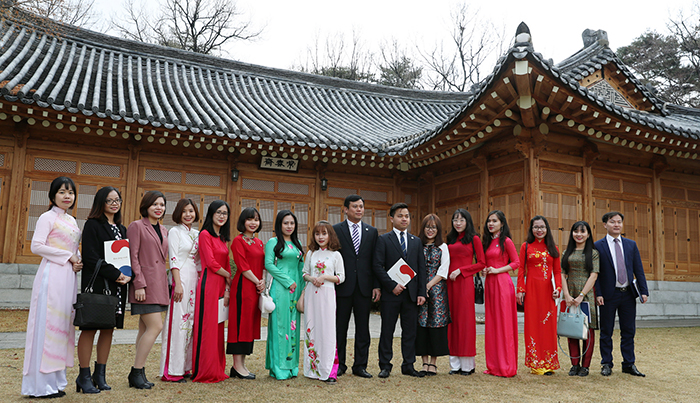-
 Korea.net's 24-hour YouTube channel
Korea.net's 24-hour YouTube channel- NEWS FOCUS
- ABOUT KOREA
- EVENTS
- RESOURCES
- GOVERNMENT
- ABOUT US
View this article in another language
- 한국어
- English
- 日本語
- 中文
- العربية
- Español
- Français
- Deutsch
- Pусский
- Tiếng Việt
- Indonesian

Vietnamese students studying in Korea pose for a commemorative photo in front of the Sangchunjae Hall at Cheong Wa Dae before a lunch with first lady Kim Jung-sook on March 8. (Jeon Han)
By Sohn JiAe
Video = Kim Sunjoo
All relationships go through ups and downs, and this is sometimes referred to in Chinese characters as buchim (부침, 浮沈).
The relationship between Korea and Vietnam, for example, has experienced buchim. It has gone through times of chim (침, 沈), meaning “sinking in water,” but nowadays has been experiencing times of bu (부, 浮), "floating on water."
It has been just 25 years since the 1992 establishment of diplomatic ties between Seoul and Hanoi, and, among the 10 ASEAN member-states, the two are now each other's largest trading partners, largest giver or receiver of investment, have the greatest human-to-human exchanges and the deepest level of development cooperation.
In particular, the free trade agreement (FTA) that the two countries struck in 2015 has caused bilateral trade to skyrocket. In 2017, trade between Korea and Vietnam hit USD 63.9 billion, up 42 percent compared to the USD 45.1 billion seen in 2016. That's the fourth-largest for Korea, following mainland China, the U.S. and Japan. The number of Vietnamese people hired by Korean companies has now topped 1 million.
The current Korean government is keeping an eye on this undoubted and infinite potential for growth in the Vietnamese market, too.
President Moon Jae-in stated the goal of reaching "USD 100 billion in trade with Vietnam by 2020” when he held a summit with Vietnamese President Tran Dai Quang on the sidelines of the Asia-Pacific Economic Cooperation summit in November 2017. President Moon also chose the central Vietnamese city of Da Nang for his first state visit in 2018, which kicks off on March 22.
The 25-year, solid friendship between the two has changed perceptions of the Vietnamese people toward the Korean people, and vice versa, as well.
In Korea, for example, most public views toward the Vietnamese people used to be “immigrant worker” or “immigrant women who married a Korean man.” However, such limited and outdated perceptions have changed. Now, respondents say that Vietnam is “a country worth investing in,” due to the younger generation in their 20s and 30s accounting for more than 50 percent of the entire population of Vietnam.
Such changes in perception among Koreans have been possible for a good reason: a soaring number of Vietnamese students coming to study in Korea.
According to statistics released in October 2017 by the Ministry of Education, Vietnamese students numbered 14,614, among the total number of international students in Korea of 123,858. That's an increase of around eight times compared to a decade ago in 2007. That number comprises 11.8 percent of the entire non-Korean university students in Korea.
Nguyen Thi Thanh Mai, a 29-year-old Vietnamese graduate student majoring in international trade at Kangwon National University, realized that the way in which the Korean people looked at young Vietnamese like her has changed recently, too.
“I could feel a sense of negativity among people who I often saw, calling Vietnamese residents ‘cheap workers’ or ‘uneducated women who travel to marry a Korean man for money.’ However, now just as many people come to land a real job in Korea, a country that they want to learn more about, and more young people travel here to study, like me. Their views on us have changed, I think,” the Vietnamese student said on March 8. She was visiting Cheong Wa Dae at the invitation of first lady Kim Jung-sook to attend a lunch along with 15 other Vietnamese undergraduate or graduate students in Korea.
- What are the common perceptions of Koreans among Vietnamese?
It’s the best! Especially since the sensation of Park Hang-seo, the head coach of Vietnam’s national football team who helped to make Vietnamese football so successful, the image of Korea has improved very much.
The high quality and affordable prices of Korean products, too, as well as Korean content like movies and TV shows, are really sought after.
- What’re your post-graduation plans?
I want to get a job here in Korea. Whether it’s related to international trade, my major, or to heritage and traditions, I’d like to do anything that will contribute to more bilateral exchanges between Korea and Vietnam.
- If there's any advice you'd like to give to the Korean government, what would it be?
I’d like to thank the Korean government for making it possible for me to come to study here. After graduation, I’ll return all the benefits that I've enjoyed by doing anything that could further better the Korea-Vietnam relationship.
jiae5853@korea.kr
Most popular
- China warmly welcomes first Korea-born giant panda Fu Bao
- First hearing-impaired K-pop act hopes for 'barrier-free world'
- Novelist Hwang's 'Mater 2-10' shortlisted for Int'l Booker Prize
- Expats could account for 7% of population in 20 years: report
- Nat'l Fire Agency picks 137 elite staff for deployment abroad













